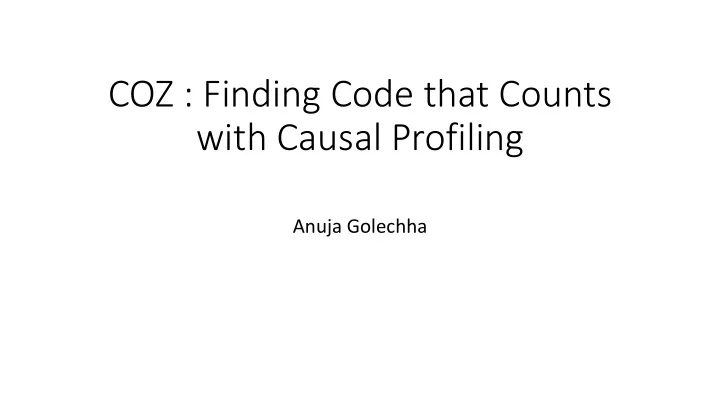

COZ : Finding Code that Counts with Causal Profiling Anuja Golechha
Agenda • Profiling • Issues with current profilers • Causal profiling • COZ – Overview and Implementation • COZ Evaluation • Comparison with Pivot Tracing
Profiling • Profiler Types • Instrumentation • Sampling
Issues with current profilers • Only report how long code runs for • Code that runs for a long time might not be the best choice for optimization • Example – loading animation during file download • Do not report potential impact of optimization
Example Application
Example Application – Speed up Search
Example Application – Speed up Save
Causal Profiling – Virtual Speedup
Example Application – Virtual Speedup Send
Example Application – Virtual Speedup Send
Example Application – Virtual Speedup Send
Example Application – Virtual Speedup Compress
Example Application
Causal Profiling • Performance experiments • Associated with a line of code and a percent speedup value • Progress Points – View effect of optimization on both throughput and latency • Progress point – a line of code indicating the end of a unit of work • Throughput – measured by rate of visits to each progress point • Latency – use two progress points • Difference between counts at start and end points gives how many requests are currently in progress • Rate of visits to the start point gives the arrival rate • Little’s Law – average latency = number of requests in progress / arrival rate
COZ • Prototype for Linux • Implementation Details • Dedicated profiler thread • Flexibility – User can specify a scope to control which lines are considered for potential optimizations
COZ - Causal Profiling Overview • Profiler Startup • Map instructions to source code using the program’s debug information • Create profiler thread • Performance Experiment Initialization • Randomly choose a line and a percent speedup • Apply Virtual Speedup • Pause other threads if sample belongs to selected line of code • Experiment end • Pre-determined time • Cooloff period
COZ Virtual Speedup Implementation Uses Sampling s – number of samples of selected line P – sampling period n – number of times selected line is executed d - delay
COZ Virtual Speedup Implementation • Pauses other threads using counters • Global counter – the number of times each thread should have paused • Local counter – the number of times a thread has already paused • Thread must pause and increment local counter if local < global • Suspended threads – Thread must execute all required delays before a potential blocking operation or waking up another thread
COZ Evaluation – Types of Optimizations • Identifying bottleneck • Dedup – hash bucket traversal (8.9 % actual, 9% predicted) • SQLite – overhead of indirect function calls (25 %) • Reallocation of resources based on COZ’s predicted impact • Ferret – reallocation of threads across stages (21.2 % actual, 21.4% predicted) • Points of Contention – downward sloping causal profile • Fluidanimate – replaced custom barrier by default (37 %) • Memcached – removed lock while updating reference counts (9 %)
COZ Evaluation – Overhead • Average – 17.6 % overhead • Possible optimizations to improve overhead – • Collect and process debug information lazily to reduce startup overhead • Amortize sampling cost by sampling globally instead of per-thread • Reduce delay overhead by allowing normal execution between experiments for some time
Comparison with Pivot Tracing • Type • Sampling vs Dynamic Instrumentation • Causality • COZ – Effect of optimization on total runtime / throughput / latency • PT – Correlation between events (abstraction of happened-before joins) • PT – For distributed systems • COZ – Focuses on CPU usage
References • https://www.sigops.org/s/conferences/sosp/2015/current/2015- Monterey/printable/090-curtsinger.pdf • https://www.usenix.org/node/196222 • https://github.com/plasma-umass/coz • http://sigops.org/s/conferences/sosp/2015/current/2015- Monterey/printable/122-mace.pdf • http://pivottracing.io/ • https://en.wikipedia.org/wiki/Profiling_(computer_programming)
Thank You
Recommend
More recommend